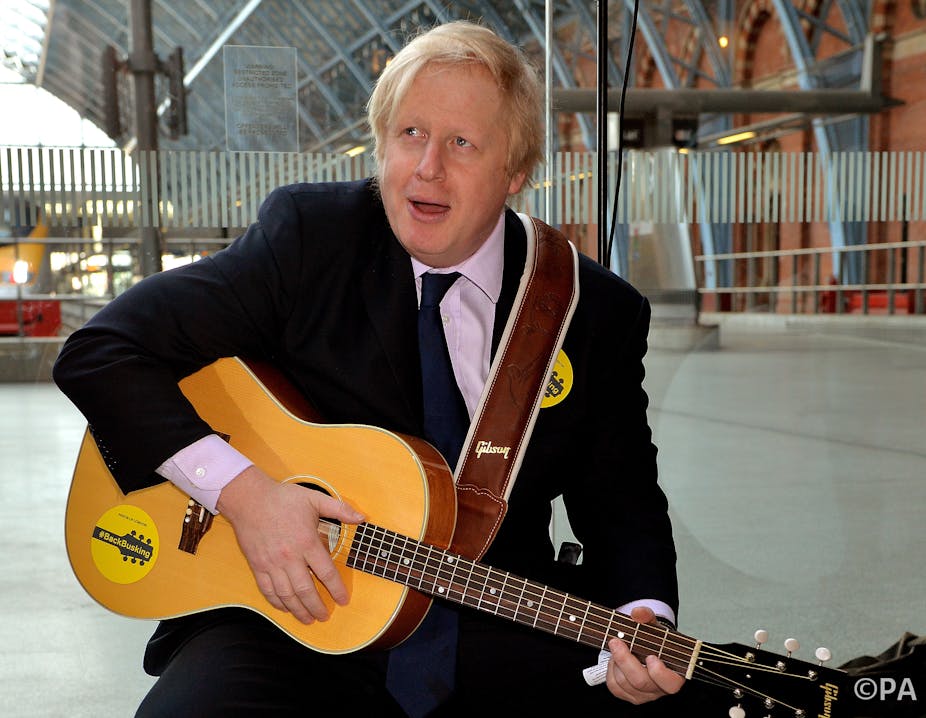There is a certain section of the Conservative Party – and not necessarily a minority – which has a penchant for self-destruction. This is the same section which takes its leadership cues from Nigel Farage rather than David Cameron; that section which has repeatedly frustrated the latter’s attempts to modernise the party, while steadfastly drawing the leadership back towards the types of agenda, on Europe and immigration and so on, which proved so electorally damaging for the party throughout the noughties.
It is this section of the party who will most warmly be relishing the prospect of Boris Johnson, positioning himself for a potential future bid for the party leadership. But are they right to relish this prospect?
Tory politics of the past
If you look at the context both inside and outside of the Conservative Party, there are a number of factors which suggest that Boris is the right man for the role. Within the party, his main strength is that he represents the very antithesis to Cameron’s modernisation. This is key to many backbenchers and grassroots members. Like a throwback to a character in an old Ealing comedy such as School for Scoundrels, support for Boris looks backwards rather than forwards – to some idea of an old-school Tory politics of the past.
His studied elitism, his very public gaffes on issues of gay marriage and race in particular and his supposed Euro-scepticism all demonstrate his pre-EU, pre-PC credentials. They help animate that seemingly growing section of the party, and indeed the electorate more broadly, who are easily entertained by outrageous and shocking proclamations of casual chauvinism. In these respects, both Boris and Farage appear to have found a winning formula: a unique combination of traditionalism and posh populism which has the power to transcend class boundaries and resonate very widely.
Style over substance
It is unlikely that Boris really does believe that Britain would prosper outside of the EU. But that is not important as it is his overall performance, rather than any issues or agenda he may bring to the table, which is the key to his success. In Boris, much more so than Cameron, we see the triumph of style over substance that the current media driven political climate appears to demand. This gives him the ideal political capital to have a strong appeal outside of the party.
In an era defined by “anti-politics” and record levels of public disaffection and mistrust of our political leaders, Boris, along with Farage, seems like the perfect antidote to our current malaise. A man who seems somehow “down to earth” (even though his social background belies this), trustworthy (despite his track record) and generally a hugely likeable bloke who has the capacity to re-engage us all in the political sphere.
Boris’ strength is his weakness
But, are all of Boris’ great strengths enough to take him over the line and into the position of PM? Or would elevating him towards the role of Tory party leader merely represent another instance of the party pushing the self-destruct button?
Here Tories might be wise to take a cue from their own Michael Gove and take a closer look at British political history. As history repeatedly demonstrates, being both likeable and trustworthy has very rarely proved to be enough.
If there has been one defining feature of successful leadership and a winning electoral formula in the UK, which has been tried and tested over time, it is the notion of strong and decisive government. And this is not just a historical demand; it has never been so prescient in the modern era where one of the key factors cited for public disaffection is the general lack of hands on leadership. Therein lies a problem for Boris. For the idea of strong government here has invariably been linked in the UK to notions of conviction, responsibility and competence – all qualities which Boris’ very carefully crafted persona suggests he lacks in abundance.
In this respect, it is highly possible – probable even – that Boris’ very strengths could ultimately prove to be his main weaknesses.
His key strength lies in the very fact that he breaks the mould of the archetypal politician. In the current climate he represents a breath of fresh air and a welcome change to what the public has hitherto been offered.
But converting this popularity into votes for him as prime minister will be a tough nut to crack in a country with a long history of stoic, dedicated and responsible prime ministers. At no point has the words “casual careless buffoonery” ever been inserted into the job spec and neither is it ever likely to.
Moving from mayor to PM
Granted, Boris has been a highly successful London mayor who has repeatedly defied his critics. But a mayoral role is a world away from that of prime minister. There exists a very strong lineage of eccentric or maverick mayors – take a look at Toronto’s crack smoking mayor Rob Ford for example.
Taking the step from popular party leader to electable prime minister requires a giant leap. The very fact that Boris is even being touted as capable of making it is testament to the fact that his style and performance is a winning one, which is attractive to a lot of voters. But that style and performance rests entirely on his display of qualities which run completely counter to the values and attributes which the British electorate have tended to demand from their prime ministers. The British public have generally not been apt to elect leaders just so they can enjoy a bit of pantomime.

